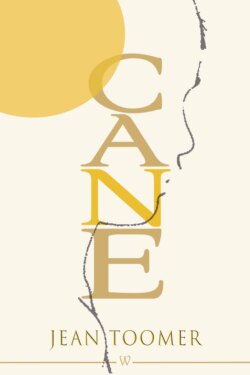Читать книгу Cane - Jean Toomer - Страница 20
На сайте Литреса книга снята с продажи.
3
ОглавлениеEsther is twenty-seven.
Esther sells lard and snuff and flour to vague black faces that drift in her store to ask for them. Her eyes hardly see the people to whom she gives change. Her body is lean and beaten. She rests listlessly against the counter, too weary to sit down. From the street some one shouts, “King Barlo has come back to town.” He passes her window, driving a large new car. Cut-out open. He veers to the curb, and steps out. Barlo has made money on cotton during the war. He is as rich as anyone. Esther suddenly is animate. She goes to her door. She sees him at a distance, the center of a group of credulous men. She hears the deep-bass rumble of his talk. The sun swings low. McGregor’s windows are aflame again. Pale flame. A sharply dressed white girl passes by. For a moment Esther wishes that she might be like her. Not white; she has no need for being that. But sharp, sporty, with get-up about her. Barlo is connected with that wish. She mustnt wish. Wishes only make you restless. Emptiness is a thing that grows by being moved. “I’ll not think. Not wish. Just set my mind against it.” Then the thought comes to her that those purposeless, easy-going men will possess him, if she doesnt. Purpose is not dead in her, now that she comes to think of it. That loose women will have their arms around him at Nat Bowle’s place to-night. As if her veins are full of fired sun-bleached southern shanties, a swift heat sweeps them. Dead dreams, and a forgotten resolution are carried upward by the flames. Pale flames. “They shant have him. Oh, they shall not. Not if it kills me they shant have him.” Jerky, aflutter, she closes the store and starts home. Folks lazing on store windowsills wonder what on earth can be the matter with Jim Crane’s gal, as she passes them. “Come to remember, she always was a little off, a little crazy, I reckon.” Esther seeks her own room, and locks the door. Her mind is a pink meshbag filled with baby toes.
Using the noise of the town clock striking twelve to cover the creaks of her departure, Esther slips into the quiet road. The town, her parents, most everyone is sound asleep. This fact is a stable thing that comforts her. After sundown a chill wind came up from the west. It is still blowing, but to her it is a steady, settled thing like the cold. She wants her mind to be like that. Solid, contained, and blank as a sheet of darkened ice. She will not permit herself to notice the peculiar phosphorescent glitter of the sweet-gum leaves. Their movement would excite her. Exciting too, the recession of the dull familiar homes she knows so well. She doesnt know them at all. She closes her eyes, and holds them tightly. Wont do. Her being aware that they are closed recalls her purpose. She does not want to think of it. She opens them. She turns now into the deserted business street. The corrugated iron canopies and mule-and horse-gnawed hitching posts bring her a strange composure. Ghosts of the commonplaces of her daily life take stride with her and become her companions. And the echoes of her heels upon the flagging are rhythmically monotonous and soothing. Crossing the street at the corner of McGregor’s notion shop, she thinks that the windows are a dull flame. Only a fancy. She walks faster. Then runs. A turn into a side street brings her abruptly to Nat Bowle’s place. The house is squat and dark. It is always dark. Barlo is within. Quietly she opens the outside door and steps in. She passes through a small room. Pauses before a flight of stairs down which people’s voices, muffled, come. The air is heavy with fresh tobacco smoke. It makes her sick. She wants to turn back. She goes up the steps. As if she were mounting to some great height, her head spins. She is violently dizzy. Blackness rushes to her eyes. And then she finds that she is in a large room. Barlo is before her.
“Well, I’m sholy damned—skuse me, but what, what brought you here, lil milk-white gal?”
“You.” Her voice sounds like a frightened child’s that calls homeward from some point miles away.
“Me?”
“Yes, you Barlo.”
“This aint th place fer y. This aint th place fer y.”
“I know. I know. But I’ve come for you.”
“For me for what?”
She manages to look deep and straight into his eyes. He is slow at understanding. Guffaws and giggles break out from all around the room. A coarse woman’s voice remarks, “So thats how th dictie niggers does it.” Laughs. “Mus give em credit fo their gall.”
Esther doesnt hear. Barlo does. His faculties are jogged. She sees a smile, ugly and repulsive to her, working upward through thick licker fumes. Barlo seems hideous. The thought comes suddenly, that conception with a drunken man must be a mighty sin. She draws away, frozen. Like a somnambulist she wheels around and walks stiffly to the stairs. Down them. Jeers and hoots pelter bluntly upon her back. She steps out. There is no air, no street, and the town has completely disappeared.
